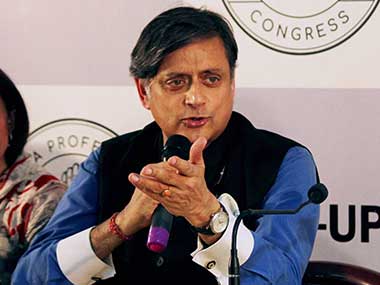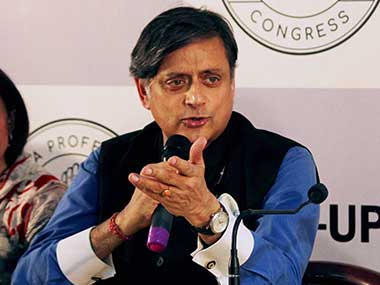Congress leader and former external affairs minister Shashi Tharoor spoke to a jam-packed audience at Koyna Hostel mess in Jawaharlal Nehru University on Sunday. The topic of the programme was centrist politics. A lot of questions were raised regarding the relatively rosy picture he painted of the Congress, Indian history, Hinduism and the NSUI (Congress student wing). He attempted to answer them, but the contradictions in his discourse were glaring. [caption id=“attachment_4669321” align=“alignleft” width=“380”]  File photo of Shashi Tharoor. PTI[/caption] This year in JNU has marked a new era in campaigning malpractices by big parties. Despite the partial electoral code of conduct being in place, top political leaders have been visiting the campus to campaign. The Akhil Bharatiya Vidyarthi Parishad (ABVP) took 600 students to Parliament to meet Venkaiah Naidu, the Vice President of India, who urged them to support the party. They then called the three BJP chief ministers of Assam, Manipur and Arunachal Pradesh for a talk in a bid to appeal to the students of those areas. The NSUI, in turn, called former minister P Chidambaram and then Tharoor. Never in the history of the campus have so many political bigwigs descended to interfere in student elections and campaign for their respective student wings: undermining the free and fair process in an election where independent candidates have the right to a level playing field. Tharoor utilised a microphone and a speaker system: for which the ABVP (when they called three BJP chief ministers of North East states) and the NSUI (when they called Chidambaram) received show-cause notices. At the end of the programme, Tharoor openly urged the students present (far outnumbering the NSUI crowd: the biggest public meeting this year) to vote for the NSUI, feigning ignorance over how the student organisation functions in campuses across India and a clear violation of electoral rules. However, several contradictions between speech and practice—regarding centrism, student politics, Hinduism, government policy and the NSUI—went largely unanswered in the polemics of Tharoor’s prose of idealism: 1. Liberal and Left propaganda has been an abject failure over the past decade. Being someone who has done research on the RSS and the BJP : their success lies in their long-term propaganda and not simply in calculated electoral engineering. How does the soft Hinduism today followed by half the Congress party and offered by its chief Rahul Gandhi (who was projected as “Krishna avatar” in Gujarat, and now as a “Shiva avatar” is leaving on the Kailash Mansarovar pilgrimage) come off as “centrist politics”? 2. Fascism is a reaction to the status quo. Is soft Hinduism the alternative rather than a proper socio-economic agenda? 3. How does the Congress expect to counter the BJP without a progressive policy agenda? On universal free public healthcare, on universal school and higher education, on caste discrimination and atrocities, on discrimination and hate crimes against Muslims, Christians, people from North East and tribals? And how about a higher minimum wage, decent housing, removing hunger, unemployment, and implementing gender justice? 4. What does the Congress plan to do with the findings of the Sachar Committee report (which shows the economically dismal state of most Muslims) if it comes to power? 5. Does being centrist mean not taking a stand? What are your views on the new blasphemy law introduced by Captain Amarinder Singh in Punjab? 6. A progressive platform will unite an ideologically loose mahagathbandhan—and might put some of the Opposition alliance partners in better light in the public eye than their current personas—as well as give the alliance some policy credibility. Simple electoral mathematics, Oppositional politics/grandstanding and social engineering will not be a solution. What dream will you sell to the Indian people: as the Modi era has become more about retail politics? 7. Where does the Congress stand on the role of intellectuals and students in this country, and how does it plan to foster them in this era of anti-student, anti-intellectual government policy? 8. If the Congress is pro-intellectual and pro-ordinary students, shouldn’t senior Congress leaders have a role to play in combating the lumpenism, money-and-muscle power of the NSUI, that mirrors the ABVP in campuses such as Delhi University? The SFI presidential candidate in DU was attacked by NSUI goons just the other day. 9. As an intellectual, how does one “resist the vindictive and parochial politics” of some sections of the NSUI itself: such as distributing alcohol and biryani in 2013 in JNU? 10. What are your thoughts on Kancha Illiah Shepherd’s critique (“Swami Shashi”, published in Caravan) of your book “Why I Am A Hindu”? Whether appropriating and reclaiming Hinduism, asserting that caste is not part and parcel of the Hindu pantheon is a losing electoral strategy and a revisionist socio-intellectual history? Is reclaiming Hinduism not tantamount to a final discarding of the Nehruvian legacy? 11. If the NSUI is secular, why did one of their last year’s central panel candidates sign a letter as Hostel president asking for Najeeb’s expulsion from hostel, with no mention of the attack on him? Where did the current NSUI president stand on this issue back then? Even Najeeb’s mother made a strong complaint to the NSUI National president Firoz Khan regarding this. Why does the Congress not bring them to book? 12. The current discourse from the Opposition is that we are expected to unite in the face of saffron authoritarianism, but should we not hold Congress leaders, such as Kapil Sibal, who in his stint as Human Resource Development Minister introduced the disastrous FYUP system in Delhi University, accountable for the damage caused to public higher education institutions during their tenures? And the neo-liberal economic policy of the Congress that the BJP has only built upon and extended to favor monopoly capital? Not to mention how progressive intellectuals were branded as Naxal-sympathisers by former home minister P Chidambaram as well as the sheer number of Muslim youth wrongfully implicated in false terror cases. The performance was flashy and the delivery was smooth: But major questions still remain that must be addressed by Opposition leaders to the youth of this country, and for the Congress to explain to the nation at large. The author is a PhD researcher in Modern and Contemporary History at Centre for Historical Studies, Jawaharlal Nehru University.
Several contradictions between speech and practice—regarding centrism, student politics, Hinduism, government policy and the NSUI—went largely unanswered in the polemics of Shashi Tharoor’s prose of idealism
Advertisement
End of Article
Written by Saib Bilaval
Research scholar in Modern and Contemporary History at Centre For Historical Studies, Jawaharlal Nehru University, New Delhi, India see more


)

)
)
)
)
)
)
)
)



